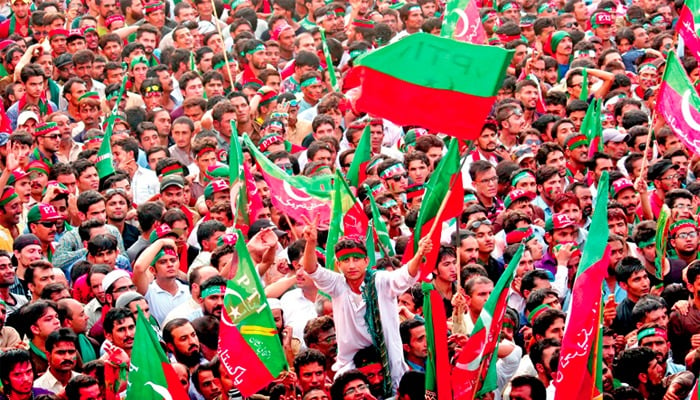Is PTI a clear favourite to win LG polls in Karachi?

A much-delayed local government election will be held on August 28 in Karachi, if it is not postponed due to a forecast of heavy rainfall and flooding.
In the country’s most populous city, the local government is divided into 246 union committees (UCs), which are distributed among 25 town municipal corporations (TMC), carved out of seven districts.
It is a large electoral exercise, in which several slots are chosen directly by the voters.
Winner takes all?
In the run-up to the election, political pundits and leaders are finding it increasingly hard to predict which political party will emerge victorious in the polls, considering the uncertainty of the current politics in the metropolis.
It is unlikely, some say, that a single political party will achieve the target of winning over 124 UCs alone, which would put it in a comfortable position to clench the office of mayor.
Until the last local government polls that were held in December 2015, Karachi's politics has long been dominated by a single fault line: the Muttahida Qaumi Movement (MQM), with its secure vote bank, versus everybody else.
In 2015, the MQM swept the local body polls by bagging 134 of 209 UCs and named a mayor.
But, experts say, the city’s political dynamics have greatly changed after an intense Rangers-led crackdown on the MQM, following a controversial speech by its founder, Altaf Hussain, on August 22, 2016, which incited party workers to attack the offices of news channels.
Prior to the paramilitary operation, the MQM had ruled the city for three decades through a mix of genuine support from the Muhajir community, neighbourhood-level party structure, and deployment of violence and fear.
Laurent Gayer, a French social scientist and author of ‘Karachi: Ordered Disorder and the Struggle for the City’ believes that Karachi is a house divided. It no longer has a dominant political party.
“The local government polls will probably reflect this with a scattered vote,” he told Geo.tv, “In a way, this is good news. This opens space for more voices, reflecting the diversity of the city's population. At the same time, this will be a challenge for urban governance, without a clear decision-making centre.”
Karachi is the country’s most ethnically diverse city, where various ethnic populations mostly reside in their own neighborhoods of influence and majority. It would not be wrong to say that in Karachi, there are several cities within the city and every district and town has its unique political diversity.
Ethnic vote bank: Which way will it swing?
Since the crackdown, the MQM has been weakened and its secure Muhajir vote bank has been split into various groups. After dissociating itself with its founder, who continues to succeed in convincing his supporters to boycott the election process, its 2016 off-shoot, the Muttahida Qaumi Movement-Pakistan (MQM-P) has been facing financial and administrative challenges.
Adding insult to injury, the rise of the right-wing Tehreek-e-Labbaik Pakistan (TLP), in the lower-income Muhajir neighbourhoods of the city, has further split the MQM’s electorate. The TLP has been trying to revive the Barelvi school of thought since the fall of the Jamiat Ulema-e-Pakistan following the MQM’s formation in the 1980s.
In June, the MQM-P won the by-polls in NA-240, the party’s traditional constituency in Karachi, with a narrow margin of just 65 votes over the TLP.
“In 2018’s national election, the TLP divided voters in the lower-income Muhajir areas,” an MQM-P leader told Geo.tv, on the condition of anonymity, “The MQM-P only managed to win four instead of ten of the 21 National Assembly seats from Karachi.”
In Karachi, is PTI surfing a popularity wave?
There is another strong contender now: the PTI, which won 14 National Assembly seats in 2018 from the city and bagged votes across ethnicities and classes.
The recent victory in Karachi’s NA-245 by-polls, a week before the local government election, has given a further boost to the PTI.
Amid a low voter turnout in the constituency, the PTI candidate defeated an MQM-P contender, who had the backing of the ruling alliance in the Center, including the Pakistan People’s Party, the Pakistan Muslim League-Nawaz, the Jamiat-e-Ulema Islam-Fazal and the Awami National Party.
“Not a single jalsa (rally), no strong policy statement nor a good campaign but still PTI won Karachi like a walk in the park,” commented Ebad Ahmed, a Karachi-based journalist, “Rather than denying the obvious wave, journalists and researchers should see why the urban middle class stands with PTI and why Imran Khan's cult is strong and continues to grow.”
But the Jamaat-e-Islami, which was once a major stakeholder in Karachi’s politics, is just as confident that the party’s ongoing Karachi Rights Movement would help it regain its lost strength in the local government polls, to clench the slot of mayor.
While taking advantage of being a ruling party in Sindh, and MQM’s weakening, the PPP is also on a quest to name its mayor in the city. It is in fact using every trick in the book to secure the goal. One of which is the delimitation of constituencies, which its opponent alleges was done on purely ethnic and not administrative lines.
The PPP, which has its support base mostly in the Sindhi and Baloch-populated neighbourhoods in the city, has also made electoral alliances and seat adjustments with various political parties at the local level. It further plans to forge a broader alliance with more political parties by splitting towns among them, in order to gain the mayor's vote.
Sartaj Khan, a political analyst with an interest in Karachi’s electoral politics, said that though PPP has used its administrative powers to manipulate the delimitation process, its success is unclear due to a number of factors.
“The PPP is considered a party that has protected the interests of rural Sindh,” he tells Geo.tv, adding that due to this reason the party could face opposition in urban areas.
What does the future hold?
Karachi is known for its history of ethnic hostilities, which was exploited by criminal elements for killings, kidnappings, extortion, and other heinous crimes just a few years before the start of the Rangers-led operation in 2013.
Gayer explains that the Karachi operation cut political parties down to size, and made them toothless by dismantling their military apparatus.
“They no longer have power over life and death, presiding over each and every activity in the city,” he said, “Yet, it would be a mistake to think that Karachi has been fully pacified.” He adds that across the city, ethnic tensions, social suffering and political grievances are growing, “waiting for a spark to ignite.”
— Rehman is a freelance journalist and researcher. He tweets @zalmayzia




